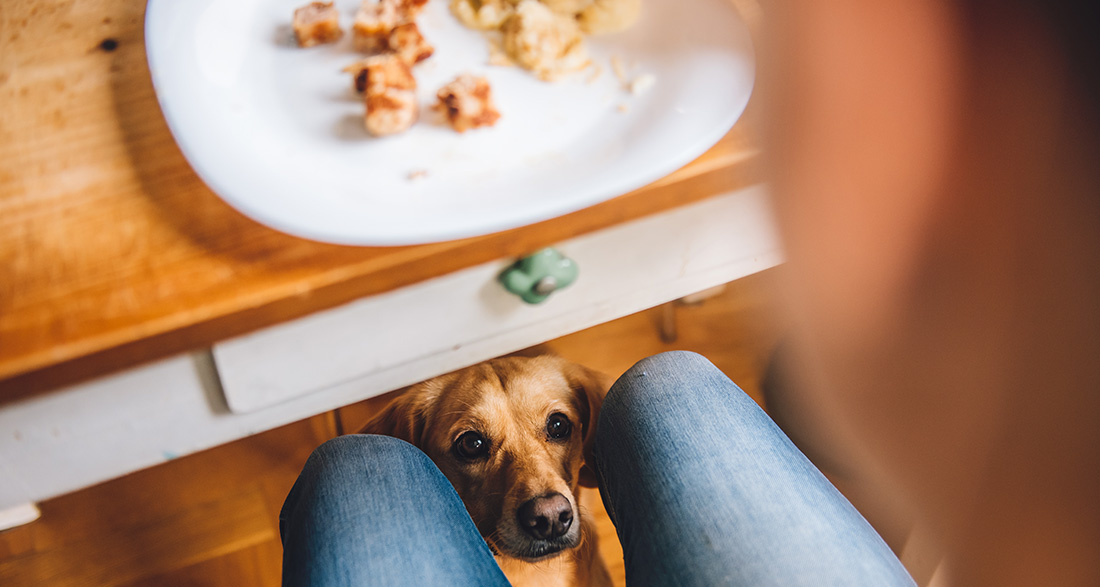Does your dog belong to the category that scrutinizes every bite you take? Dog trainer Maren Grote discusses furry table guests and the lasting consequences of minor inconsistencies.
Four-legged beggars
The Sunday roast is ready. The family is looking forward to a peaceful meal. “I shouldn’t live like a dog,” thinks many a four-legged friend, catching the delicious scent and making every effort to attract the attention of their humans. “Shouldn’t I get something too?”
If the heart-wrenching Dachshund gaze doesn’t lead to success, other tactics come into play: paws scratch delicately at fine stockings, noses persistently and vehemently nudge elbows, and especially clever dogs may even use their teeth to tug at the tablecloth until everyone understands the silent plea: “Give me some!”
Incorrect conditioning
Begging for food is a behavior dogs learn in their puppyhood. Those who don’t express themselves vocally and physically to their mother won’t get fed. Ideally, an adult dog should eventually outgrow this behavior. Not every dog owner is bothered by their canine companion’s begging. After all, the beloved family member is just expressing what it wants: a share of the cake. If the dog begs for cuddles, it gets them eventually. From the dog’s perspective, it has manipulated things in the “right direction.”
Stay consistent
The rule to break the habit of undesirable behavior is simple: Never, truly never, feed the dog at or from the table! Those fortunate enough to train a young dog from the beginning and remain consistent will likely enjoy peaceful meals. When clear rules are followed, a dog can be conditioned only to specific triggers. If a dog is allowed, for example, to lick the yogurt container, it will only beg when the coveted dairy treat is in sight.
Some dog breeds are more prone to being food enthusiasts than others. Inconsistent behavior, such as occasionally dropping a treat from the table, is particularly intriguing for them. They quickly feel encouraged to express their desire more persistently. Thus, it is mainly up to the human to relieve the dog of stress by demonstrating willpower and consistency when it comes to obtaining a highly coveted item at all costs.

No scolding
From an educational perspective, there is actually nothing wrong with occasionally letting oneself be manipulated by the dog. However, it becomes difficult when the dog persistently demands that the human always dance to its tune and immediately satisfy every need in various situations. This also applies to begging at the table.
Reprimanding a begging dog with loud words usually achieves nothing. Often, the dog is not even interested in filling its stomach. “Attention” is the magic word. Even with negative attention, meaning reprimanding words or even touches, the four-legged friend has achieved its goal and receives the attention it so urgently demanded.
Lie-down training against begging
Targeted lie-down training can bring peace to the dining table. It involves directing the dog to its designated place and signaling that it must stay there until it’s allowed to get up again. Ideally, the dog should withdraw to its bed or designated place during meal preparation, allowing the owners to cook in peace. The dog should not be disturbed or spoken to during the resting period in its basket or on its designated spot. After the meal, when the table has cleared, simply release the lie-down command for the dog and continue with normal daily activities.
If the heart-wrenching Dachshund gaze doesn’t lead to success, other tactics come into play: paws scratch delicately at fine stockings, noses persistently and vehemently nudge elbows, and especially clever dogs may even use their teeth to tug at the tablecloth until everyone understands the silent plea: “Give me some!” If all else fails, there is often a whimper, and the head is placed with a loud sigh on the lap of the owner.
Is my dog a beggar?
To test how accustomed your dog is to having its requests met immediately, try ignoring any demanding and begging behavior for a few days. By “ignoring,” it’s not meant to rudely turn away but to calmly and silently not acknowledge it – without any speech, praise, punishment, commands, or gestures, without looks and hidden signals. After a phase of confusion, your unusual lack of interest will reveal the behavior in your dog that it believes is most likely to prompt a reaction from you.
You may not be able to bear to see your dog “suffer.” In that case, it will likely whine and whimper. If you’re afraid that your dog won’t like you anymore if you deny even a single request, it’s possible that it will start ignoring you just as you ignored it. It knows very well that you can’t endure this state for long! Most dogs are very clever and know exactly how to coax their humans into action. Therefore, it makes sense, within the framework of self-reflection, to “ask” your dog what it thinks of you to better understand it and its behaviors in reverse.


